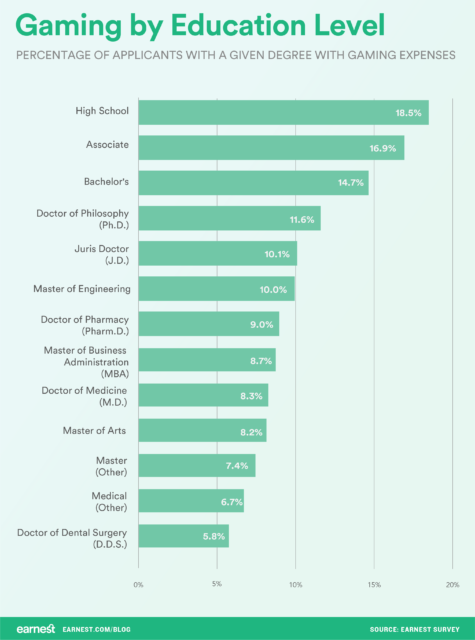Analyst: How education, age, and even degree levels can affect video game spending
The data firm Priceonomics has shared a blog post from one of its customers, the loan provider Earnest, that seeks to look at who plays video games by looking at spending habits and education level.

The data firm Priceonomics has shared a blog post from one of its customers, the loan provider Earnest, that seeks to look at who plays video games by looking at spending habits and education level.
The Earnest report is particularly interesting because the company pulls its data from spending habits rather than surveys, offering game developers a more direct look at what a “gamer” looks like in the report’s particular sample size.
With that in mind, Earnest bases its data off of applications for student loan refinancing it has received, with those applications numbering in the tens of thousands. In order to qualify as a gamer for the sake of the report, an individual had to have at least three game-related purchases totaling more than $20 across two years of spending history.
To qualify as a game-related purchase, a transaction would have to feature keywords like GameStop, Steam, Twitch, or Nintendo. By Earnest’s own admissions, the collection method itself potentially affects the data by omitting game-related purchases from general retailers or from mobile platforms that may not have been picked up by the company’s transaction filter.
Because of its niche sampling (borrowers seeking refinancing through this one specific company) and admittedly inflexible transaction filtering, the Earnest report shouldn’t be considered a snapshot of the video game market as a whole by any means, but it still has some interesting data about the spending habits of post-college video game players hidden within.
For instance, the report found that game-related spending tends to decrease for college-educated individuals as time since graduation increases, though only by a percentage or two. Of the overall college graduates included in the survey, 12.1 percent of people less than a year out from graduation spent money on video games while only 10.5 percent of those over eight years out from graduation could say the same.
Similarly, Earnest found that both younger people and applicants with less-advanced degrees were more likely to spend money on video games than older individuals or those with Masters or Doctoral degrees. But even looking at spending based on individual degrees has some interesting information to show.

For example, 11.6 percent of individuals that earned their Ph.D. had game-related expenses in their transaction history, the highest percentage of spending among advanced degrees. that drops to 10 percent for those that earned their Master of engineering degree and only 5.8 percent for graduates that claimed their Doctor of Dental Surgery.
More data on things like age and gender, as well as a handful of graphs to back each up can be found on the Priceonomics blog.
Read more about:
2018About the Author(s)
You May Also Like







.jpeg?width=700&auto=webp&quality=80&disable=upscale)








